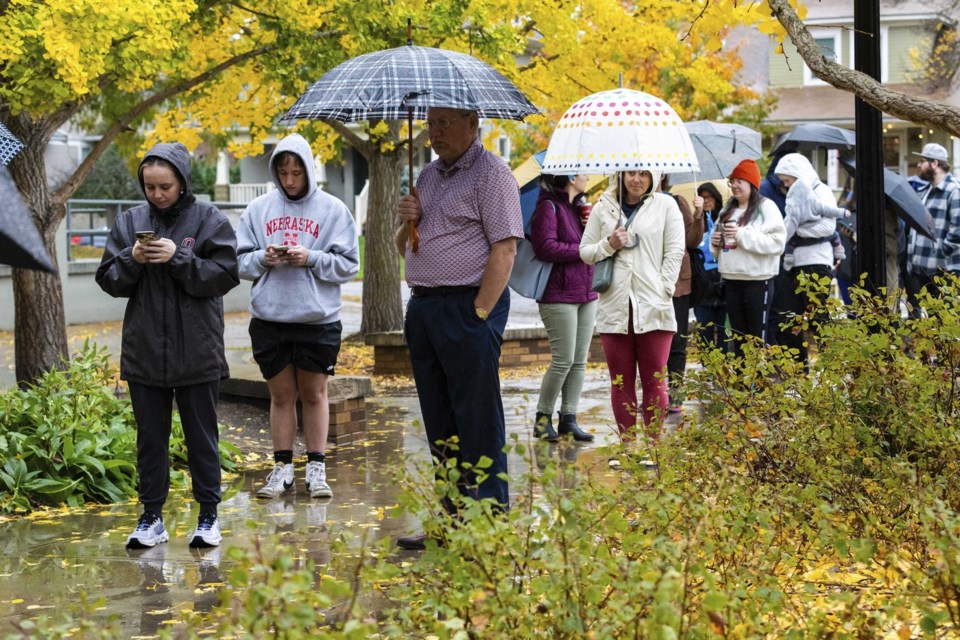OMAHA, Neb. (AP) — Nebraska voters supported a measure Tuesday that enshrines the state’s current ban on abortions after the 12th week of pregnancy in the state constitution, and they that sought to expand abortion rights. Nebraska was the first state to have competing abortion amendments on the same ballot since the U.S. Supreme Court in 2022, ending the nationwide right to abortion and allowing states to decide for themselves. The dueling measures were among a record number of petition-initiated measures on Nebraska’s ballot Tuesday.
What were the competing abortion measures?
A majority of voters supported a measure enshrining the state's current ban on abortion after the first 12 weeks of pregnancy in the state constitution. The measure will also allow for further restrictions. Last year, the Legislature passed the 12-week ban, which includes exceptions for cases of rape and incest and to protect the life of the pregnant woman.
Voters rejected the other abortion measure. If they had passed it by a larger number of “for” votes than the 12-week measure, it would have amended the constitution to guarantee the right to have an abortion until viability — the standard under Roe that is the point at which a fetus might survive outside the womb. Some babies with medical help after 21 weeks of gestation.
Abortion was on the ballot in several other states, as well. Coming into the election, voters in all seven states that had since the reversal of Roe had favored abortion rights, including in some conservative states.
Who is behind the Nebraska abortion measures?
The 12-week ban measure was bankrolled by some of Nebraska's wealthiest people, including Republican Sen. Pete Ricketts, who previously served as governor and donated more than $1.1 million. His mother, Marlene Ricketts, gave $4 million to the cause. Members of the Peed family, which owns publishing company Sandhills Global, also gave $1 million.
The effort was organized under the name Protect Women and Children and was heavily backed by religious organizations, including the Nebraska Catholic Conference, a lobbying group that has organized rallies, phone banks and community townhalls to drum up support for the measure.
The effort to enshrine viability as the standard was called Protect Our Rights Nebraska and had the backing of several medical, advocacy and social justice groups. Planned Parenthood donated nearly $1 million to the cause, with the American Civil Liberties Union, I Be Black Girl, Nebraska Appleseed and the Women’s Fund of Omaha also contributing significantly to the roughly $3.7 million raised by Protect Our Rights.
What other initiatives were on Nebraska’s ballot?
Nebraska voters approved two measures Tuesday that will create a system for the use and manufacture of medical marijuana, if the measures survive an ongoing legal challenge.
The measures legalize the possession and use of , and allow for the manufacture, distribution and delivery of the drug. One would let patients and caregivers possess up to 5 ounces (142 grams) of marijuana if recommended by a doctor. The other would create the Nebraska Medical Cannabis Commission, which would oversee the private groups that would manufacture and dispense the drug.
Those initiatives were challenged over allegations that the petition campaign that put them on the ballot broke election rules. Nebraska's attorney general said supporters of the measures may have submitted several thousand invalid signatures, and one man has been charged in connection with 164 allegedly fraudulent signatures. That means a judge could still invalidate the measures.
Voters also opted Tuesday to repeal a new conservative-backed law that allocates millions of dollars in taxpayer money .
Finally, they approved a measure that will require all Nebraska employers to provide at least 40 hours of paid sick leave to their employees.
Margery A. Beck And Josh Funk, The Associated Press


